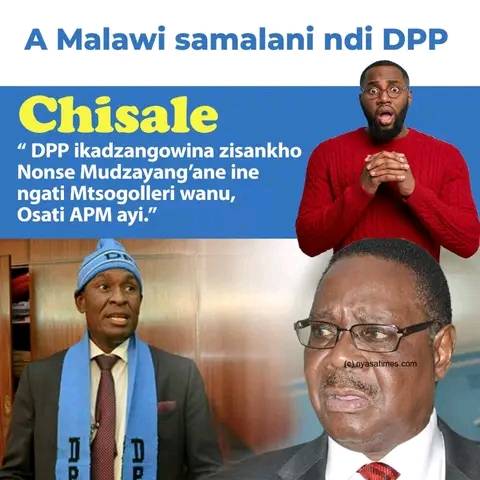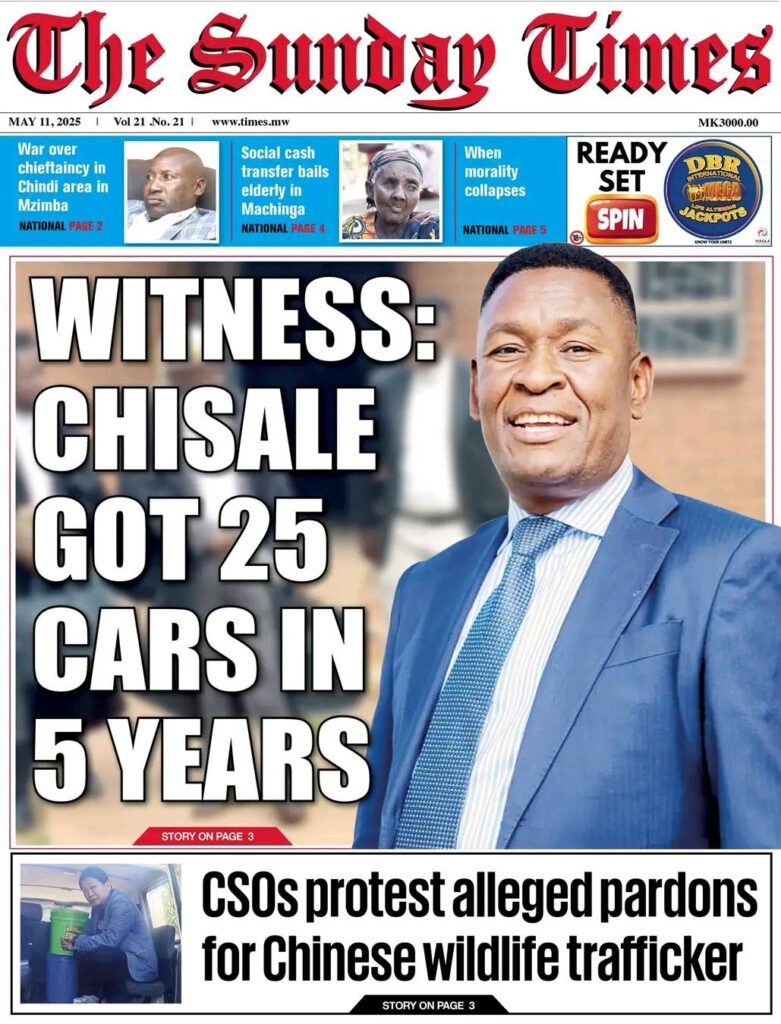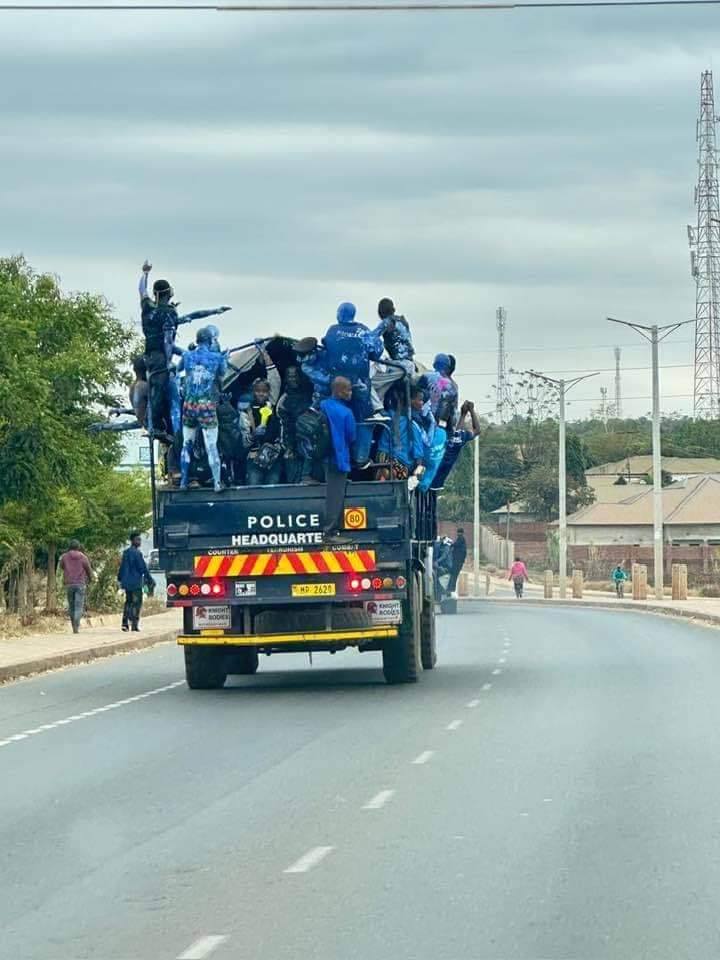Malawians must wake up. The latest High Court ruling against Norman “Pythius Hiwa” Chisale is more than just another legal setback for the former presidential bodyguard; it is a powerful reminder of how close Malawi came to being looted beyond repair during the Democratic Progressive Party (DPP)’s corrupt reign.
The court’s decision to uphold the freezing of Chisale’s questionable billions of wealth is a triumph for the rule of law. But more importantly, it is a warning.

It is a warning against ever allowing the DPP—a party soaked in impunity, theft, and institutionalized greed—to return to power.
Norman Chisale was not an elected official. He was not a businessman of renown. He was merely the bodyguard and trusted aide of former President Arthur Peter Mutharika. Yet, somehow, he amassed staggering wealth during his years in State House.
Multiple luxury vehicles worth billions of kwachas, posh mansions, and vast bank accounts now under legal scrutiny speak volumes about how state power was abused under the DPP administration. In 2021, the High Court issued a preservation order, freezing Chisale’s assets, including 86 vehicles and 21 properties, estimated at over K5 billion.
Last Friday, High Court Judge Anneline Kanthambi dismissed Chisale’s latest application to access his frozen bank accounts, which he claimed he needed for “legal fees and daily upkeep.” The judge ruled, rightly so, that Chisale had failed to meet the legal threshold under the Financial Crimes Act. In plain language: his request was nonsense.
This isn’t the first time Chisale has tried to access his frozen assets, and it won’t be the last. But the fact that the courts have repeatedly shut him down is a testament to how rotten his dealings appear to be. It also serves as a commendable show of resolve by Malawi’s justice system—a rare bulwark in a country too often captured by elite impunity.
If Norman Chisale is the poster boy of DPP-era theft, then Arthur Peter Mutharika is its enabler-in-chief. Under his leadership, the DPP became a syndicate of public resource looters disguised as a political party.
Mutharika either turned a blind eye or was complicit in a long list of dubious transactions, from the Malawi Housing Corporation house he himself bought for less than K1 million, to the shady deals involving city land gifted to his wife, Gertrude Mutharika, under the Beautify Malawi campaign, and the dubious importation of cement using his tax exemption status.

Let us not forget: the list of DPP’s systematic plunder of government coffers is bottomless. Dubious contracts. Questionable land sales. Fictitious payments. Nepotism. Cronyism. And when Malawians finally kicked them out in 2020, they left behind a broken economy, empty institutions, and a demoralized public service.
The return of Arthur Peter Mutharika, which looters like Chisale are aggressively campaigning for, means one thing and one thing only: a full resurrection of the looting syndicate. And with that comes the return of Norman Chisale, and others like him, to the corridors of power where they do not belong.
Chisale is not alone. Vice Presidents within the DPP such as Jappie Mhango, Joseph Mwanamvekha, and Alfred Gangata have all faced legal troubles or been named in scandals that date back to DPP’s time in government. Mhango, recently arrested by the Anti-Corruption Bureau (ACB), is accused of abusing his office to sell government property at undervalued prices to his relatives.
There is no smoke without fire. The DPP’s leadership is riddled with individuals who treated public office as a get-rich-quick scheme. And if they return to power, you can be sure they will waste no time picking up where they left off.
In a country where politics often seem to override justice, the High Court’s firm stance on Chisale’s assets should be applauded. It reaffirms that no one is above the law—not even those who once operated in the shadows of the presidency.
By refusing to unfreeze Chisale’s wealth, the judiciary is upholding the very principle of justice that the DPP tried so hard to erode.
During their rule, interference in state institutions was the norm. Investigative bodies like the ACB were neutered, civil service was politicized, and the media was under threat. Rebuilding these institutions has been slow, but the courts are proving to be a final line of defense.
In their desperate bid to return to power, the DPP is portraying themselves as victims of political persecution. They want to sweep aside the glaring evidence of corruption as mere vendettas. But the facts speak for themselves. The arrests, the court rulings, the asset freezes—these are not politically motivated stunts; they are consequences of unchecked criminality.
To support the DPP now is to willfully forget the pain of the past. It is to excuse theft. It is to condone impunity. And it is to invite Chisale and his ilk back into power where they will once again treat Malawi as a personal ATM.
Malawi is a country of immense potential, yet year after year, its promise is hijacked by corrupt leaders who view public service as a gateway to personal enrichment. The DPP perfected this model, and Norman Chisale is the embodiment of its failures.
Young people deserve jobs, not corrupt leaders. Farmers deserve inputs, not stolen subsidies. Hospitals deserve medicines, not procurement scandals. And taxpayers deserve transparency, not grand theft paraded as governance.
As we approach another election cycle, Malawians must be clear-eyed about what is at stake. The return of the DPP is not a return to stability; it is a return to theft and merciless plunder of state resources. It is a return to fear. It is a return to a past we fought so hard to escape.
Let Chisale’s courtroom defeats serve as a rallying cry. We must never again allow crooks to masquerade as leaders. The courts are doing their part. Now it’s time for the people to do theirs.
Reject impunity. Reject corruption. Reject the DPP.









